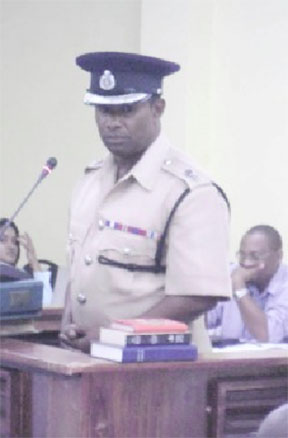Over one week after he said young women should dress morally acceptable to prevent the commission of rape and following three days of protest actions coupled with a public outcry, Commander of A Division Clifton Hicken has apologized for his statement.
The commander’s apology—issued through the Guyana Police Force’s Public Relations Depart-ment—also came shortly after Commissioner of Police Seelall Persaud met a group of protestors, who had taken their third day of protest action to his Eve Leary office, and apologized for the commander’s utterance.
“Divisional Commander ‘A’ Division, Senior Superintendent Clifton Hicken, wishes to apologise to all members of the Guyanese society who have been negatively affected by his comments made in relation to the offence of rape…,” the press release said.
It described his comments as being “unfortunate and a “bad choice of words” since he like every other member of the force “understands rape to be a violent act of power and aggression by the perpetrator on a weaker person.
“Rapists are criminals who ought to be treated as such, and victims are certainly not responsible for the violence committed against them.”
Hicken’s apology came almost after a week of sustained condemnation via the media and picketing exercises. The latest organisation to add its voice to the denouncing of the statement was the Guyana Women Lawyers Associa-tion and it was preceded by Red Thread, the Society Against Sexual Orientation Discrimination (SASOD) and Citizens against rape (CAR). Individuals such as activist Mark Benschop and University of Guyana lecturer Dr Melissa Ifill and had also joined the picketing line along with other concerned Guyanese.

Human rights activists Sherlina Nageer, who was one of the protestors who met Commissioner Persaud, felt the commander was forced to apologise, noting that he took a week to do so. She said she was not sure if it was picketing exercise that propelled him to do so but stated she was not convinced of his sincerity adding that actions speak louder than words and when rape victims are treated better by members of the force she “would feel better.” For her it was a good public relations move by the police and she advocated for others to from them, singling out Minister of Health Dr Behri Ramsarran as one such individual who she said would not even meet protestors to hear their concerns about the fact that health institutions are not equipped with rape kits.
“But I would take it [the apology] for what it is worth. It is something. It is not everything; maybe the beginning of something,” Nageer said while adding that she is not convinced that more training for police officers is the answer, though it would not hurt.
Just about six protestors had arrived outside Persaud’s office, when he sent someone to invite them to meet him. Nageer said he apologized for his officer’s comment and stated that he does not support such a view and neither does the force. She said they raised the difficulties of specific cases where rape victims experience difficulties pointing out that it is the line of thinking expressed by Hicken that may have contributed to this. He promised to have the matters investigated and took details of same.
Last Monday, during the presentation of rape statistics, Hicken had said, “You know, we’re speaking of preventing somebody from committing an offence and yet we are creating an atmosphere in terms of our society.”
He then added, “When we are within our partnership programmes we advocate for the young females who seem to be vulnerable in a certain age group – that moving from around 13 to 18, 16 to 18 – and we always try to embrace an attire that would be accepted morally.”
A day later, the police issued a statement in which it advised the public that Hicken had been “taken out of context.” [And] “the Divisional Commander had no intention to, in any way, justify sexual assaults.”
According to the GPF, while men should not interpret women’s attire as sending “a particular type of signal… it is happening to some degree.”
The release went on to say that information from interviews of suspects in sexual assault matters and intelligence from discussions among elements of criminal groups, which had been infiltrated suggested that “the mode of dress of the victims may have contributed to the suspects’ selection of targets.” That being the case, it added, Hicken felt “obligated to share that information as one of his crime prevention strategies focusing on sexual assault.”




